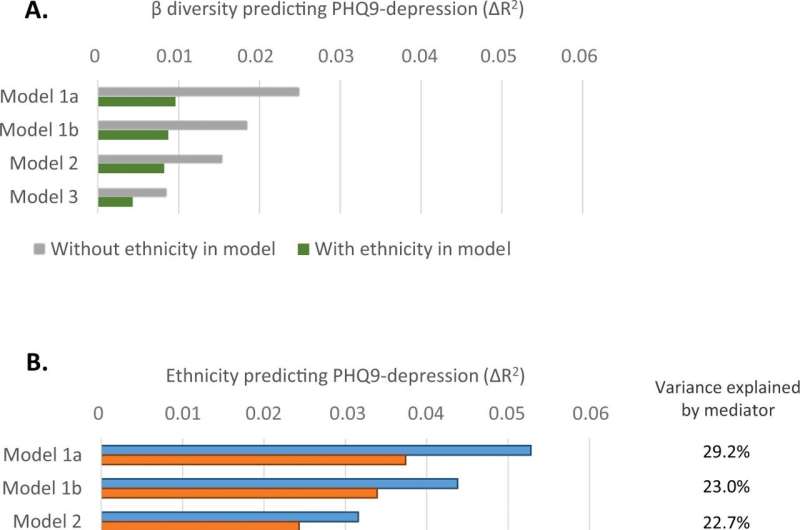Microbiome composition found to influence depression

Our microbiome, the billions of microorganisms that live in and on our bodies, control many important bodily functions, including those in our brain. Recent research by Amsterdam UMC, the University of Amsterdam and Erasmus MC delivers the most extensive evidence to date of a relationship between the composition of the microbiome and instances of depression. This composition also plays a role in the differing rates of depression across different ethnic groups.
These studies, based partly on data from the HELIUS study, appear today as a double publication in Nature Communications.
A wide variety of microorganisms, such as bacteria, viruses and yeasts, live on and in the human body. All those microorganisms together are called the microbiome. The microbiome is necessary for optimal physical functioning; for example, through the production of essential nutrients and protection against pathogens. Disturbances in the microbiome increase the risk of numerous diseases. For example, there is increasing evidence that variousbrain diseases are also related to disturbances in the microbiome.
Role of the microbiome
These results come from the most extensive study into the relationship between the microbiome and depression, involving 3,211 participants from the HELIUS study, led by professor Max Nieuwdorp. This research shows a clear relationship between the composition of the microbiome and depression.
A microbiome containing less diverse bacteria, or in which certain bacterial species are underrepresented, was associated with having depression or more depressive symptoms. This association was as strong as established risk factors for depression such as smoking, alcohol consumption, a lack of exercise and being overweight. Influencing the microbiome may therefore be hugely relevant for the treatment of depression.
“Now that we know which disturbances in the microbiome are significant for depression, this opens up new possibilities for treatment and prevention. Which is urgently needed,” says Anja Lok, psychiatrist and researcher at the Department of Psychiatry at Amsterdam UMC.
Ethnic differences
Previous research from the HELIUS study has illustrated ethnic differences in both the composition of the microbiome and the occurrence of depression. But until now no connection between the two had been found.
Researcher Jos Bosch, from the University of Amsterdam’s Department of Psychology, says, “The substantial ethnic differences in depression do indeed appear to be related to ethnic differences in the microbiome. We don’t know exactly why this is yet. This association was not caused by differences in lifestyle such as smoking, drinking, weight or exercise, and merits further investigation. For example, diet could play a role.” This is the first study to show that the disparity in depression between population groups is related to the composition of the microbiome.
Confirmation by Rotterdam study
It is important to determine whether the relationships found between the microbiome and depression can be confirmed by other studies. In the second article in Nature Communications, by researchers from Erasmus MC, the data from the HELIUS study and ERGO study were compared. This comparison confirmed a consistent association between twelve groups of bacteria and the occurrence of depression and offered an explanation: the twelve bacterial groups produce substances such as glutamate, butyrate, serotonin and gamma amino butyric acid.
These so-called “neurotransmitters” play an important role in depression. “These results therefore clearly provide direction for future research into possible treatments, such as the use of probiotics, prebiotics and synbiotics or fecal microbiota transplantation as well as changes to lifestyle and diet,” says Anja Lok.
More information:
Jos A. Bosch et al, The gut microbiota and depressive symptoms across ethnic groups, Nature Communications (2022). DOI: 10.1038/s41467-022-34504-1
Djawad Radjabzadeh et al, Gut microbiome-wide association study of depressive symptoms, Nature Communications (2022). DOI: 10.1038/s41467-022-34502-3
Citation:
Microbiome composition found to influence depression (2022, December 7)
retrieved 7 December 2022
from https://phys.org/news/2022-12-microbiome-composition-depression.html
This document is subject to copyright. Apart from any fair dealing for the purpose of private study or research, no
part may be reproduced without the written permission. The content is provided for information purposes only.
For all the latest Science News Click Here
For the latest news and updates, follow us on Google News.

